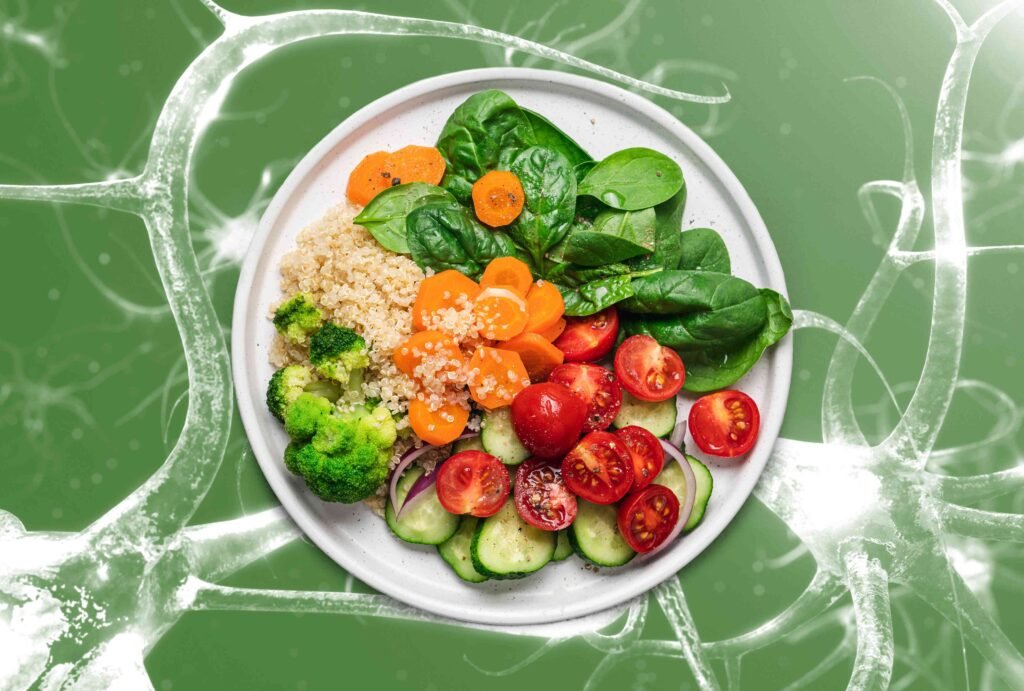Your gut and brain are connected in surprising ways. Discover how gut health can shape mood, anxiety, and mental clarity—with science-backed tips.
Most people associate the gut only with digestion—but it’s actually a key player in regulating mood, cognition, and emotional well-being. Research highlights the importance of the gut-brain-microbiota axis, which allows two-way communication between the digestive tract and the central nervous system. This connection may explain chronic issues like brain fog, low energy, or even persistent anxiety.
In this article, we’ll explore how the gut microbiome influences mental health by shaping neurotransmitters, modulating immune responses, and affecting hormonal balance—plus simple lifestyle strategies that support this internal dialogue.
1. The Gut–Brain Superhighway: More Than Just Digestion
Deep inside your abdomen lies the enteric nervous system, often called the “second brain.” This complex network communicates directly with the brain through the vagus nerve, forming the core of the gut-brain-microbiota axis. This axis relays chemical signals like cytokines, hormones, and microbial metabolites that affect everything from focus to emotional regulation.
Interestingly, nearly 95% of the body’s serotonin—a major neurotransmitter tied to emotional stability—is synthesized in the intestinal lining. Helpful microbes such as Lactobacillus and Bifidobacterium produce key mood compounds like dopamine and GABA, supporting emotional balance and clarity.
When this system is disrupted by chronic inflammation, nutrient-poor diets, or high cortisol levels, it can result in mood swings, brain fog, or behaviors such as salt cravings. Even dysregulated breathing patterns can impair neural communication between gut and brain.
Deep inside your abdomen lies the enteric nervous system, often called the “second brain.” This complex network communicates directly with the brain through the vagus nerve, forming the core of the gut-brain-microbiota axis. This axis relays chemical signals like cytokines, hormones, and microbial metabolites that affect everything from focus to emotional regulation.
Interestingly, nearly 95% of the body’s serotonin—a major neurotransmitter tied to emotional stability—is synthesized in the intestinal lining. Helpful microbes such as Lactobacillus and Bifidobacterium produce key mood compounds like dopamine and GABA, supporting emotional balance and clarity.
When this system is disrupted by chronic inflammation, nutrient-poor diets, or high cortisol levels, it can result in mood swings, brain fog, or behaviors such as salt cravings. Even dysregulated breathing patterns can impair neural communication between gut and brain.
2. How Gut Microbes Shape Your Mood
The trillions of microbes in your gut don’t just digest food—they influence your mind through biochemical pathways:
- Neurochemical production: Microbes synthesize neurotransmitter precursors like tryptophan and tyrosine, leading to serotonin and dopamine release. They also modulate GABA levels, which regulate stress and calm the nervous system.
- Inflammatory signaling: A disrupted microbiome—known as dysbiosis—can lead to a compromised intestinal barrier or “leaky gut.” This allows endotoxins like LPS into the bloodstream, activating systemic inflammation and increasing stress hormones like cortisol.
- Short-chain fatty acids (SCFAs): Beneficial bacteria ferment dietary fiber to produce SCFAs like butyrate, which reduce inflammation, strengthen the gut lining, and influence brain function by interacting with the blood-brain barrier.
Modern diets low in prebiotic fiber and high in refined carbs reduce SCFA output, weakening the gut-brain connection. Diets rich in vegetables, legumes, and fermented foods can reverse this trend—similar to advice shared in our lasting weight loss strategies.
Next, we’ll dive into the latest findings from lab research and how they’re being confirmed by real-world patient stories.

3. From Mice to Humans: What the Research Shows
Animal research has played a vital role in uncovering how the gut influences mood. In controlled studies, germ-free mice—those raised without exposure to microbes—exhibited intense anxiety, hypersensitivity to stress, and altered social behavior.
In a pivotal experiment, scientists transferred gut microbiota from depressive mice into healthy ones. The recipients quickly developed similar mood-related symptoms, suggesting that emotional patterns can be transmitted through microbial transplantation.
Human case studies echo these findings. After the infamous Walkerton water contamination in Canada, many residents reported lingering emotional distress long after their infections cleared. Researchers linked this to long-term disruption of the gut ecosystem triggered by pathogens.
Clinical trials and a meta-analysis of 15 studies found that individuals with mood disorders had less microbial diversity and higher concentrations of certain pro-inflammatory groups like Proteobacteria. Interestingly, targeted interventions using probiotics and dietary adjustments were shown to improve mental health scores—sometimes with effects comparable to antidepressants, but with fewer side effects.
This highlights how environmental triggers and microbial imbalance intersect—something we explore further in why people doubt natural remedies even when they work.
4. Real-Life Mood Shifts from Gut Interventions
While laboratory findings are valuable, some of the most compelling evidence for gut-mood interactions comes from real-world experiences—people reporting emotional breakthroughs after targeting gut health.
Case 1: Daniell Koepke, a woman struggling with irritable bowel syndrome (IBS), self-administered fecal microbiota transplants (FMT) using samples from both her brother and her partner. Interestingly, her digestive issues eased—but mood changes emerged depending on the donor, raising new questions about how microbial profiles influence emotional and hormonal balance.
Case 2: Jane Dudley, diagnosed with bipolar disorder that resisted traditional medications, began home-based FMT protocols. Over time, she reported long-lasting relief from depressive symptoms. Though her approach lacked clinical oversight, it spotlights the gut’s potential role in managing complex psychiatric conditions.
Clinical Observation: In another case, a senior patient with chronic depression tried a targeted probiotic called Target gb‑X. Their gut discomfort rapidly subsided, and mood levels improved—without adjusting antidepressant prescriptions. This hints at gut-focused solutions complementing psychiatric care.
Digital Narratives: Online forums also reflect growing interest. One user transitioned to a whole-food, high-fiber diet with salmon and greens. They described enhanced emotional clarity, creative flow, and more social ease. Others noted gut flare-ups directly preceding depressive dips—suggesting a synchrony between digestion and mental state.
Though anecdotal, these experiences align with growing scientific theories about the microbiome’s broader role. For more examples of hidden root causes, see our article on how cellular energy loss might fuel fatigue.
Mini How-To: Calm the Gut, Lift the Mood
- Build one “fiber + fermented” meal daily (beans/oats + curd/yogurt).
- Breathe nose-in, long-out: in 3, out 6 for 60 seconds before eating.
- Walk 5–10 minutes after meals; get morning daylight when possible.
Result: steadier digestion and smoother mood in 1–2 weeks. Example: yogurt at lunch + a 10-minute after-dinner walk cut my 4 p.m. dip. Limit: not for acute GI disease or restrictive-eating concerns—use clinical care. Learn the simple habit engine and see the hunger loop.

5. What You Can Do — Mood-Friendly Gut Strategies
Improving your gut health doesn’t require extreme measures. Small, daily changes in your diet and lifestyle can reshape your microbiome and positively influence your mood. Here’s how to get started:
- Eat more fiber-rich whole foods: Aim for 7+ servings of vegetables, legumes, and whole grains daily. These feed beneficial bacteria and support short-chain fatty acid (SCFA) production, crucial for mental clarity and emotional resilience. Check out our guide to lasting weight loss for meal inspiration.
- Add fermented foods: Foods like yogurt, kefir, kimchi, and sauerkraut introduce helpful bacteria that support gut balance and mood regulation.
- Cut down on ultra-processed foods: These often contain emulsifiers, artificial sweeteners, and preservatives that disrupt the gut lining and reduce microbial diversity.
- Consider psychobiotic foods: These are prebiotic and probiotic foods specifically known to impact emotional health. Examples include garlic, onions, oats, bananas, and fermented dairy.
- Exercise regularly: Aerobic activity increases SCFA-producing gut strains and lowers inflammation. Plus, movement boosts natural endorphins and cognitive performance. Learn more about hidden stressors in our article on poor breathing habits and brain health.
If–Then Rules You Can Use
- If mornings feel anxious, then eat a protein-first breakfast.
- If afternoons crash, then add fiber + fermented food at lunch.
- If sleep is broken, then stop caffeine after 2 p.m. and dim lights.
- If cravings spike at 4 p.m., then take a 7–10 minute walk.
- If bloating tracks stress, then do 60 seconds of in-3/out-6 breaths before meals.
Example: yogurt + oats at lunch and a 10-minute walk cut my 4 p.m. slump in a week. Limit: not for acute GI illness or restrictive-eating concerns—follow clinical guidance.
These strategies aren’t just good for your gut—they can also impact things like heart health, energy production, and hormone regulation.
6. Future Frontiers — Psychobiotics & Fecal Transplants
As the gut-mood connection becomes clearer, researchers are now exploring more targeted treatments that go beyond general probiotics. Two promising frontiers are psychobiotics and fecal microbiota transplants (FMT).
Psychobiotics refer to specific strains of probiotics that have been shown to influence mental health. These may help reduce anxiety, boost emotional resilience, and improve overall well-being—especially when combined with dietary changes and stress-reduction habits.
While many over-the-counter probiotic blends lack precision, clinical studies have identified certain strains (like Lactobacillus rhamnosus and Bifidobacterium longum) as mood-enhancing. Still, more human trials are needed before psychobiotics can replace medication.
Fecal Microbiota Transplants (FMT), though still controversial, have shown surprising success in early trials. Beyond treating chronic digestive conditions, FMT has been reported to reduce symptoms of bipolar disorder and major depression in some individuals.
That said, self-administered FMTs carry risks and should never be attempted without medical supervision. Future developments may allow for more standardized, safer applications—making gut-based mental health treatments both accessible and effective.
Mini Checklist — Who Might Benefit
• Mood dips track IBS/IBD flares • Sleep <6.5 h and sugar spikes worsen anxiety • Generic probiotics failed but fermented foods help. If ≥2 yes, consider strain-specific psychobiotics or supervised options; still start with diet, light exercise, and stress basics.
Until then, the most accessible route remains dietary change. If you’re still unsure whether food can influence mood, read about how even natural remedies are often underestimated in our article on why natural solutions are so often ignored.
7. Conclusion: Start Where the Signals Begin
Your gut isn’t just a digestion hub—it’s where mood signals form, travel, and misfire when things go wrong. Anxiety, fatigue, and foggy thinking? They may not start in your head at all.
Feed your gut like it matters: whole foods, fermented dishes, and fiber. With every choice, you shape your emotional baseline. For many, the path back to better mental health begins with the next meal.
Still unsure? This simple morning habit can jumpstart digestion and mood.
Want to explore more hidden health connections? Read about salt cravings and what they may reveal about your body or why you’re tired even after rest.
Frequently Asked Questions
Can gut bacteria affect depression and anxiety?
Yes. Specific microbes help produce serotonin and GABA—key mood-regulating chemicals. When gut balance is disrupted, inflammation can rise and brain chemistry may shift, contributing to mood disorders.
How long does it take to feel better after improving gut health?
Initial changes can appear in 2–4 weeks with a consistent gut-friendly routine. Deeper microbiota shifts that impact mood may take 8–12 weeks or longer.
What are the best probiotic foods for mental well-being?
Fermented foods like yogurt, kefir, sauerkraut, kimchi, and miso are rich in live cultures. Pair them with prebiotic fibers—found in oats, legumes, and vegetables—to boost their effect. See our whole food guide for more ideas.
Is the vagus nerve really involved in mood regulation?
Yes. The vagus nerve carries signals between your gut and brain. Supporting it through gut health, deep breathing, and even posture can influence stress and mood.
Are DIY fecal transplants safe?
No. FMT should only be done under medical guidance. DIY methods may spread infections or create imbalances in your microbiome. Learn more about safe strategies in our article on natural remedy risks.